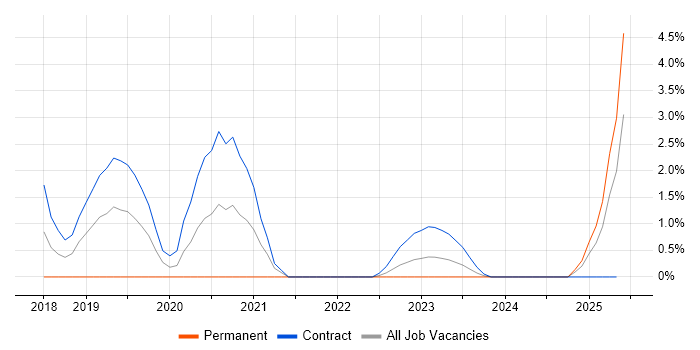Databricks
Suffolk > Ipswich
The table below provides summary statistics for permanent job vacancies advertised in Ipswich requiring knowledge or experience of Databricks products and/or services. It includes a benchmarking guide to the annual salaries offered in vacancies that cited Databricks over the 6 months leading up to 29 June 2025, comparing them to the same period in the previous two years.
The figures below represent the IT labour market in general and are not representative of salaries within Databricks.
| 6 months to 29 Jun 2025 |
Same period 2024 | Same period 2023 | |
|---|---|---|---|
| Rank | 28 | - | - |
| Rank change year-on-year | - | - | - |
| Permanent jobs citing Databricks | 1 | 0 | 0 |
| As % of all permanent jobs advertised in Ipswich | 0.93% | - | - |
| As % of the Vendors category | 1.37% | - | - |
| Number of salaries quoted | 0 | 0 | 0 |
| Median annual salary (50th Percentile) | - | - | - |
| Suffolk median annual salary | - | - | - |
All Vendors
Ipswich
Databricks falls under the Vendor Products and Services category. For comparison with the information above, the following table provides summary statistics for all permanent job vacancies requiring knowledge or experience of all vendor products and services in Ipswich.
| Permanent vacancies with a requirement for knowledge or experience of vendor products and services | 73 | 95 | 33 |
| As % of all permanent jobs advertised in Ipswich | 68.22% | 39.92% | 24.09% |
| Number of salaries quoted | 65 | 78 | 27 |
| 10th Percentile | £25,625 | £25,500 | £21,250 |
| 25th Percentile | £31,000 | £29,750 | £30,500 |
| Median annual salary (50th Percentile) | £47,500 | £50,000 | £60,800 |
| Median % change year-on-year | -5.00% | -17.76% | +15.81% |
| 75th Percentile | £55,250 | £63,750 | £76,250 |
| 90th Percentile | £59,500 | £78,750 | £89,000 |
| Suffolk median annual salary | £66,200 | £42,500 | £38,750 |
| % change year-on-year | +55.76% | +9.68% | -8.82% |
Databricks
Job Vacancy Trend in Ipswich
Job postings citing Databricks as a proportion of all IT jobs advertised in Ipswich.

Databricks
Co-occurring Skills and Capabilities in Ipswich by Category
The follow tables expand on the table above by listing co-occurrences grouped by category. The same employment type, locality and period is covered with up to 20 co-occurrences shown in each of the following categories:
